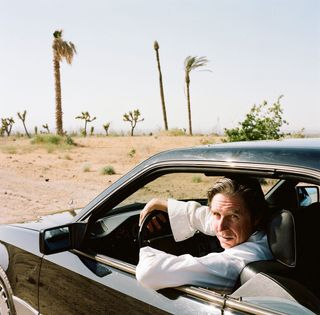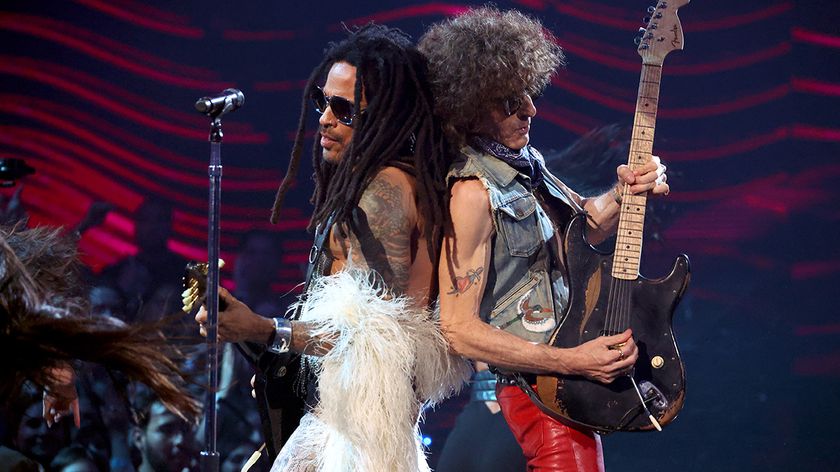John Doe of X: We're "Still Loud and Fast and Powerful and Poetic"

It’s been a busy fall/winter season for legendary punk band X.
Following a month-long U.S. tour with Blondie, the group — bassist John Doe, vocalist Exene Cervenka, guitarist Billy Zoom and drummer D.J. Bonebrake — announced their annual holiday shows, where the Blasters will join them for West Coast dates billed as A Family X-mas.
Last month, Rhino Records released a limited-edition vinyl box set featuring the albums Los Angeles, Wild Gift, Under the Big Black Sun and More Fun in the New World. The label also released a digital box set, The X Collection: 1980–1987, featuring the band’s first six studio albums, and deluxe digital versions of the band’s classic albums.
As they enter their 36th year, interest in X has never waned. Fans, including new generations of fans, continue rediscovering their music, attending their concerts, and hoping for a new album — “new” meaning new songs. In a recent interview, Doe addressed those issues and a few more.
GUITAR WORLD: We seem to be in an era of what we’ll call “classic bands” reuniting or rebanding. Some are making new music, some are not, but all are going on the road. Why the demand? The bands I interview tell me that in addition to the core audience, they also see younger fans.
I think that’s one of the reasons that X continues to play. We’ve taken hiatuses, time off, but we’ve continued to play since we started. If we didn’t have a younger audience coming to see us, I think it would be less rewarding. The other reason we continue to play is because we’re still good. I can hear the band, not objectively, but I can hear how we sound and how we feel, and it’s still loud and fast and powerful and poetic and all the elements that we had before.
I think the reason people come to see that is the same reason I went to see Chuck Berry in 1973. I wasn’t 18 in 1958 when Chuck Berry was first coming up and he must have been incredible, but in 1972 or 1973, when I saw him outside of Baltimore, he blew my mind. There’s a lot of virtual stuff in our culture now, and there’s a lot of stolen — for lack of a better word — or obviously appropriated music. People like Blondie or X or the other bands you’re thinking of, they put something together, made a hybrid that was original for their era, and I think people want to see that before it goes away.
Get The Pick Newsletter
All the latest guitar news, interviews, lessons, reviews, deals and more, direct to your inbox!
You’ve released a vinyl box set. When you look at the overall timeline, and in this case, it’s a timeline that has taken its breaks, been on and off, and involved a lot of solo and outside projects, what do you see?
I see growth. I see expansive elements that created the core. The reason that there’s a four-vinyl box set is because, number one, vinyl is cool, and if it’s mastered well, it sounds different.
I think that Exene is one of the greatest writers ever, certainly one of the greatest American poets, but she wasn’t pretentious and didn’t represent herself in such a way that she’s thought of in the same light as Patti Smith. So that’s what I mean about growth and span. These four records show the growth of X from the first to the fourth record, and they’re all the records that Ray Manzarek produced with us.
How has your approach to the songs changed and grown as you have changed and grown as a musician?
In 1978, the people that the songs were written about were the audience that’s not happening now, but the events or the stories repeat through different people. In that way, the songs remain relevant.
I think that we play them better, in that we’re not trying as hard. It’s more organic, maybe, and you sing a little bit of a different melody line, or D.J. and I might play something a little differently, we realize it was good, and maybe the next night we do the same thing and that becomes part of the song, rather than the way it was before. Over time, it can’t help but shift and change.
In the late ’70s and into the ’80s, the music you and some other bands were making, certainly in the case of punk, there was anger and a desire for righting wrongs, or at least airing the issues. It was considered edgy and risqué. Now, what passes as edgy and risqué … what do you see when you look at the landscape?
It’s hard to compare because now there’s a direct line between artist and listener or consumer. I see there’s still the big game, with the capital B-I-G, which is Katy Perry or One Direction or all that pop stuff, and then there are more underground bands that become popular, like Jack White, the White Stripes, the Black Keys or Arcade Fire.
Then there are other people, like Kings of Leon, but they all fit into the arena rock sound, so that lends itself toward bigger audiences. Then there are artist like Neko Case or Wilco or My Morning Jacket that fit into something that’s a little more difficult to digest right away. It’s not as accessible, and they’re great, they’re very popular and they have a good audience, so there’s not one movement, there are many, and they're all over the place.
Has music lost its edge?
Oh, I don’t think so. I think there’s probably more great music being made now because people can get exposed to it. Unfortunately, the major record companies still haven’t learned their lesson. They're still pouring a lot of money into a few acts. Luckily, there are independent record companies and people releasing their own material, so it’s available. If you think of it as an hourglass, and the companies being the pinched part in the middle back in the 1920 through the 1990s, suddenly the Internet comes along, that bottleneck gets spread wide open, and it’s straight from creator to consumer.
When you transition from a solo project, something more entrenched in your country and folk roots, back to X, do you naturally revert to X mode, so to speak?
I do two or three things before starting an X tour. I start exercising more, and I’ll play bass for a week or two before we start, and you prepare yourself for being away from home — the same sort of thing you do before any tour. Because we’re such a well-oiled machine, we don’t have to rehearse that much. We’ll rehearse maybe once, I’m sort of chagrined to say, so it’s like riding a bicycle and it’s all easily accessible. What you bring from the other projects is a different approach, thinking about it differently, you might sing a little prettier or a little harder. That’s what goes between recording and playing — you learn different things from the different applications.
What is next for you?
I’m going to Tucson to do some solo recording, and next year I think I’m going to put out a best-of-solo stuff, which could be called The Best of John Doe: This Far. Then X is going to do some more shows. In December will be our traditional holiday tour, in which we play no Christmas songs.
We played Christmas songs for about three years. We all got together at the end of the third year that we did that, and I said, “Did anybody remark that they liked our version of 'Run, Run Rudolph’ or ‘Jingle Bells’?" Billy and D.J. and Exene all said, “No, nobody commented to me that they liked that.” I said, “Then why in the hell are we doing this? Because we don’t really think it’s that great either.” So we stopped doing it and nobody seemed to notice. So fine, fuck it. So that’s what we’re doing.
Everyone waits for new material. Will that ever happen?
I hope so. I’ve got a few songs I would love to try with X, but next year is another year. I really respect Blondie for working on new songs at their soundcheck. I think that’s fantastic. But we’ll see.
Photo: Autumn de Wilde
Read more of Doe’s interview here.
— Alison RichterAlison Richter interviews artists, producers, engineers and other music industry professionals for print and online publications. Read more of her interviews right here.
Alison Richter is a seasoned journalist who interviews musicians, producers, engineers, and other industry professionals, and covers mental health issues for GuitarWorld.com. Writing credits include a wide range of publications, including GuitarWorld.com, MusicRadar.com, Bass Player, TNAG Connoisseur, Reverb, Music Industry News, Acoustic, Drummer, Guitar.com, Gearphoria, She Shreds, Guitar Girl, and Collectible Guitar.

“We had 15 minutes left, and it was time to go… I just started playing that riff. Then Lenny goes, ‘Whoa, what’s that?’”: Lenny Kravitz guitarist Craig Ross reveals the serendipitous roots of a Kravitz classic

“The concept of the guitar duel at the end was just appalling”: Crossroads is an essential piece of '80s guitar lore, but not every guitar legend was a fan of the film









